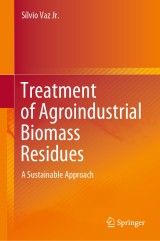Details

Treatment of Agroindustrial Biomass Residues
A Sustainable Approach|
CHF 118.00 |
|
| Verlag: | Springer |
| Format: | |
| Veröffentl.: | 15.10.2020 |
| ISBN/EAN: | 9783030588502 |
| Sprache: | englisch |
Dieses eBook enthält ein Wasserzeichen.
Beschreibungen
<p>This book provides an indispensable reference guide to the sustainable control and treatment of biomass residues from a wide variety of agroindustrial sources, e.g. sugarcane, livestock, pulp & paper, food wastes, among others.</p>
<p>Pursuing a structured and clear approach, the book opens with a general introduction to biomass, sustainability and environmental chemistry aspects, and on how the use of biomass as a renewable material ties into the UN’s Sustainable Development Goals. The book subsequently presents analytical methods applied to different biomass types and their residues and reviews monitoring and treatment strategies in order to avoid pollution of the same. The book closes by describing the value chains, bioeconomy and circular economy for globally relevant agroindustrial biomass.</p>
<p>The book is intended for researchers in academia and industry alike and shows how, in addition to sustainability criteria and life cycle assessments, integrating environmental chemistry aspects can contribute to a holistic approach, and unlock the economic potential of biomass in the age of circular economy and sustainable development.</p>
<p>Pursuing a structured and clear approach, the book opens with a general introduction to biomass, sustainability and environmental chemistry aspects, and on how the use of biomass as a renewable material ties into the UN’s Sustainable Development Goals. The book subsequently presents analytical methods applied to different biomass types and their residues and reviews monitoring and treatment strategies in order to avoid pollution of the same. The book closes by describing the value chains, bioeconomy and circular economy for globally relevant agroindustrial biomass.</p>
<p>The book is intended for researchers in academia and industry alike and shows how, in addition to sustainability criteria and life cycle assessments, integrating environmental chemistry aspects can contribute to a holistic approach, and unlock the economic potential of biomass in the age of circular economy and sustainable development.</p>
<p>Chapter 1 - Introduction.- Chapter 2 - Basis of Sustainability for Biomass.- Chapter 3 - Basis of Environmental Chemistry for Biomass.- Chapter 4 - Analytics for Biomass and its Residues.- Chapter 5 - A Review of Monitoring and Treatment Technologies.- Chapter 6 - Strategies of Monitoring.- Chapter 7 - Strategies of Treatment.- Chapter 8 - Adding Value to Biomass Residues.- Chapter 9 - Conclusions.</p><br>
<p></p><p><b>Dr. Sílvio Vaz Jr.</b> holds a D.Sc. degree in Analytical Chemistry from the University of São Paulo, Brazil, with equivalent doctorate degrees attributed from the University of Coimbra, Portugal, and from the University of Granada, Spain. Having previously served as Director and Partner at two private environmental analysis laboratories, he is currently a Senior Scientist at the National Research Center for Agroenergy of the Brazilian Agricultural Research Corporation (Embrapa), where his work focuses on the development of renewable molecules (e.g., eco-friendly agrochemicals), environmental chemistry (e.g., CO2 capture and use), agricultural chemistry, and the application of analytical chemistry to biomass and bioenergy, as well as green and sustainable chemistry. He has previously published with Springer Nature the books “Analytical Techniques and Methods for Biomass” (2016), “Biomass and Green Chemistry: Building a Renewable Pathway” (2018), “Analytical Chemistry Applied to Emerging Pollutants” (2018) and “Sustainable Agrochemistry – A Compendium of Technologies” (2019). He was appointed as the Chairman of the Brazilian Division of the American Chemical Society (03/2018–03/2019). Moreover, he serves as Professor of the graduate program in environmental engineering at the Federal University of Ouro Preto, Brazil.</p><br><p></p>
This book provides an indispensable reference guide to the sustainable control and treatment of biomass residues from a wide variety of agroindustrial sources, e.g. sugarcane, corn, rice, wheat and soybean.<p>Pursuing a structured and clear approach, the book opens with a general introduction to biomass, sustainability and environmental chemistry aspects, and on how the use of biomass as a renewable material ties into the UN’s Sustainable Development Goals. The book subsequently presents analytical techniques and methods applied to different biomass types and their residues, and reviews monitoring and treatment strategies in order to avoid pollution of the same. The book closes by describing the value chains, bioeconomy and circular economy for globally relevant agroindustrial biomass. </p>
<p>The book is intended for researchers in academia and industry alike, and shows how, in addition to sustainability criteria and life cycle assessments, integrating environmental chemistry aspectscan contribute to a holistic approach, and unlock the economic potential of biomass in the age of circular economy and sustainable development. </p>
<p>The book is intended for researchers in academia and industry alike, and shows how, in addition to sustainability criteria and life cycle assessments, integrating environmental chemistry aspectscan contribute to a holistic approach, and unlock the economic potential of biomass in the age of circular economy and sustainable development. </p>
Reviews sustainable strategies for the treatment of residues from agriculture Enhances readers’ understanding of biomass renewability Discusses bioeconomy and circular economy aspects

















